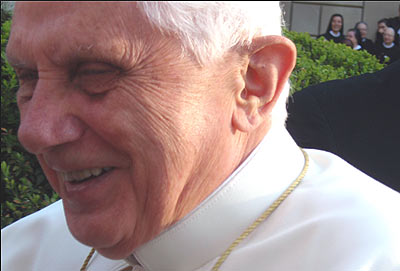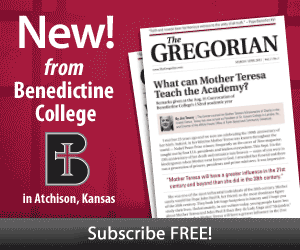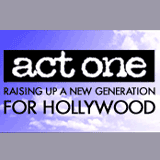Culture
‘The Father of the World’—The Pope at the U.N.

As I listened to the Pope’s U.N. address, while driving through Manhattan with Godspy editors John Romanowsky and John Murphy, and my son Gianni, on our way to videotape among the crowds at Dag Hammarskjöld Plaza, just outside U.N. headquarters, I thought to myself—what could I possibly write about the Pope’s astonishingly deep and complex address to the world community?
Fortunately, later that night, the task was done for me by Simon Fung, a talented, young Catholic graphic designer who works for Grassroots Films. As we stood with the crowd outside the East 72nd st. residence of the papal nuncio, where the Pope was staying, I asked Simon about the Pope’s address, and whether he had managed to see it. “Yes,” he said, his eyes lighting up. He then launched into a precise, succinct explanation of what the Pope had accomplished:
“As I watched the Pope addressing the general assembly of the United Nations, I couldn’t help but think: Here is the father of the world. He clearly articulated the philosophical, anthropological, sociological and theological foundations of the United Nations. To the delegates and staff whom he addressed, his words were a reminder of, or for some, an education in why they were working at the UN in the first place. This is why the UN exists; this is what all the juridical and bureaucratic structures are meant to serve: the integral human person with an intrinsic dignity rooted in the transcendent, and the common good.”
When he finished, I told him he either had to write a blog post about this, or let me quote him; he chose the latter.
Unfortunately, when I got back to my computer just now, and reviewed the press coverage of the address, I was saddened to see that the media was focused on secondary issues, like the sex abuse crisis (this was true even of Catholic bloggers). Don’t get me wrong. What the pope did—meeting with the victims—was important. But this, and a catalog of other complaints—for example, dredging up the Pope’s so-called miscues on Catholic-Jewish relations, or whether the pope would have allowed the performance of The Vagina Monologues on a college campus, or whether the liturgy at Nationals Stadium was too “multicultural”—were trivial compared to the ideas the Pope was presenting on matters of global importance: integrating faith and reason, the insidious nature of secularism, the nature of a Christian education, the role of the United Nations.
Our videotaping (the results of which we will publish here shortly), showed us a different reality. We were heartened to find many Catholics from around the country who were living the sort of radical Gospel lives the pope was talking about, many from the various lay movements, such as the Neocatechumenal Way, or the Charismatic Renewal, to name just a few.
We were also happy to find, in taping around the Park East Synagogue on the Upper Eastside, thoughtful young agnostic searchers who were open to what the Pope was saying, and who could actually talk intelligently about faith and reason. To be frank, their openness and lack of ideology was a refreshing departure from the polemics too often found in the “culture of complaint” of the blogosphere.
The pope, in just three days, has given us a lot to think about. As Simon Fung summed it up:
“At this time in history, who else can speak to the world with such wisdom, understanding and clarity? Who else can, with such humility and effortlessness, be broadcast into the homes of every American? Where does this authority come from? Without this man, who brings together the world, whose words are relevant to every human person, where would we be? Gossip, mediocrity, and chatter would rule the day.”
The main observation I had from the day’s videotaping was that the young understand this pope better than anyone else. What better hope can we ask for?
By AT 04.21.08 03:18PM Not Rated
Very good! Very well said. I loved it. The Pope is giving us a model of reasonable, gentle and intelligent dialog, which is so refreshing nowadays. He is throwing the gauntlet of faith and reason down in the public square and who knows what will happen but we can certainly pray that it will bear fruits, whether we see them right away or not.
Michèle
Szekely
Faith and a French-American worldview,
sur Le blog de la Bergerie http://www.leblogdelabergerie.com/index.htm









By lmlickona AT 04.21.08 12:15AM Not Rated
I had the same feeling when I listened to the pope’s address to Catholic educators, when he said that “freedom is a participation in Being itself.” In that forum where “academic freedom” is constantly being bandied about he took us right to the very source. No, folks, freedom is not about creating my own reality. It is about encountering Reality Itself. In the moment I heard this I found myself face to face with my own life—wondering to what extent I have been participating, delighting in, my true freedom. Pope Benedict portrays the life of faith as an adventure, something exciting and dynamic. When I was looking at those academics, I kept wondering whether anyone was “getting it.”
I have to say that today I was watching—dare I admit it?—Fox’s coverage of the Mass at Yankee Stadium. And those two priests that provided the color kept recommending that we, the viewers, ought to “read the texts” of the addresses. I am grateful that they are saying it. Let’s all read.